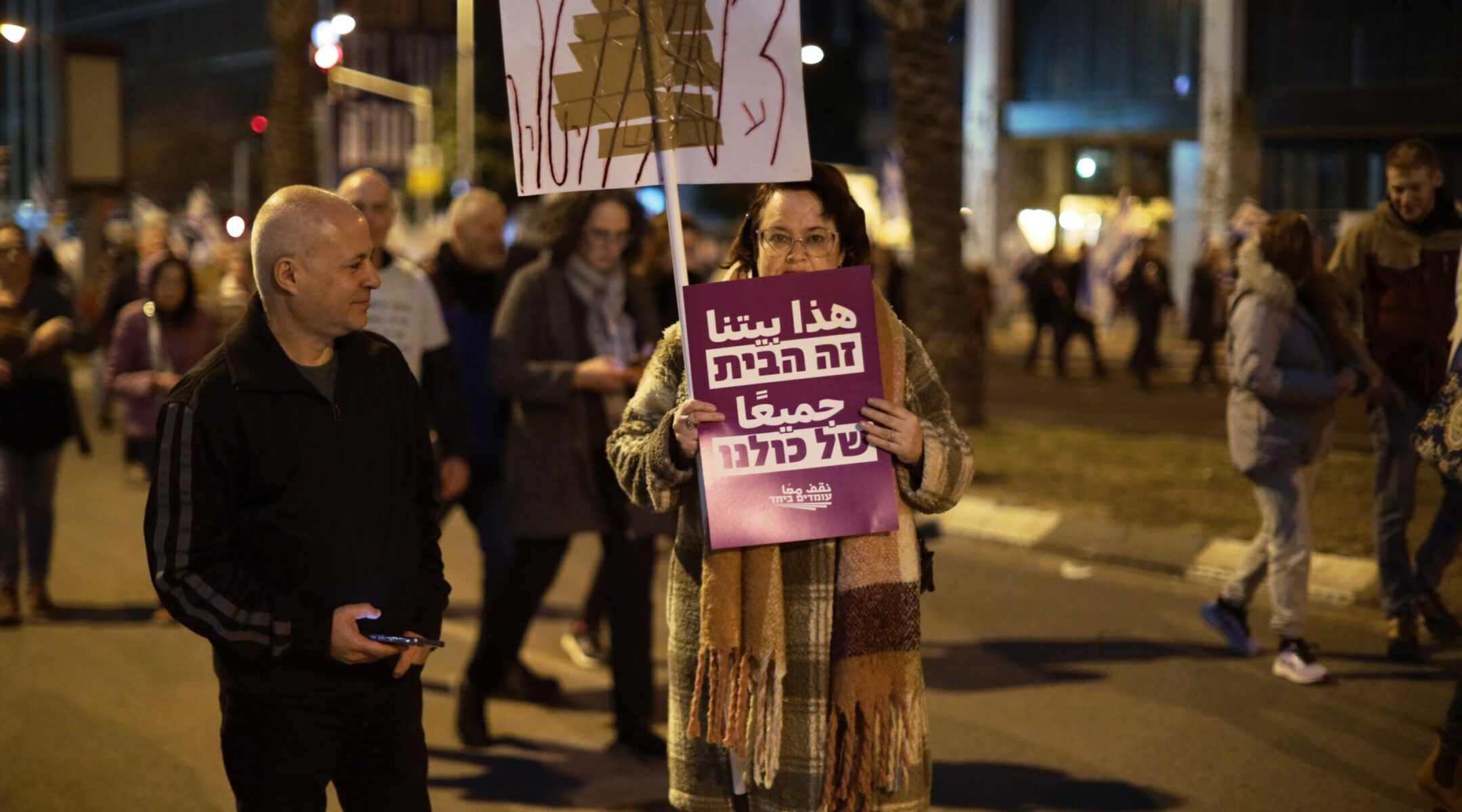(JTA) — Ever since hundreds of thousands of Israelis began pouring into the streets to oppose their government’s plan to weaken the courts, the protests have faced a contentious question: How much, if at all, should the demonstrations focus on Palestinian rights?
The answer to that question, over the past seven months, has been very little. While some demonstrators at the main weekly protest in Tel Aviv wave the Palestinian colors or wear t-shirts opposing Israel’s occupation of the West Bank, the focus of the protests has remained squarely on the judicial overhaul in part so that it can maintain a broad tent.
Several large American Jewish groups — which have historically been reticent to publicly criticize Israel’s policies toward the Palestinians — have also come out against the judicial overhaul.
Now, hundreds of American Jewish academics and other public figures, in two letters published in the past week, are calling for U.S. Jewish groups and President Joe Biden to draw a closer link between the overhaul and Israel’s treatment of the Palestinians. The overhaul, if passed in its entirety, would sap the Israeli Supreme Court of its power and independence. The first component of the legislative package passed last month along party lines.
In one petition that went online last Friday, titled “The Elephant in the Room” and directed at “leaders of North American Jewry,” 800 signatories “call attention to the direct link between Israel’s recent attack on the judiciary and its illegal occupation of millions of Palestinians in the Occupied Palestinian Territories.” The petition’s lead action item is a call to “support the Israeli protest movement, yet call on it to embrace equality for Jews and Palestinians” both within Israel’s recognized borders and in the West Bank.
The petition is topped with a cartoon by an artist named Shoshke, depicting a large elephant bearing the words “Israeli occupation” and standing in the middle of a progressive American protest. Among the signatories to the petition are professors of Jewish studies at leading U.S. universities and top Israeli professors, from the progressive writer Peter Beinart to Hasia Diner of New York University and Rabbi Chaim Seidler-Feller, the former longtime executive director of Hillel at the University of California, Los Angeles.
Palestinian scholars have also signed on, as have prominent non-Jewish scholars who are experts on Jewish-adjacent issues, including Timothy Snyder, a historian of the Holocaust, and Stefanie Schüler-Springorum, the director of the Center for Antisemitism Research in Berlin.
Separately, the liberal Jewish group Americans for Peace Now sent a letter to President Joe Biden this week thanking him for his outspoken criticism of the overhaul and urging him to extend that pressure to issues concerning the Palestinians. The letter asks Biden to “no longer automatically [prevent] efforts to hold Israel accountable at the United Nations for its settlement activities and human rights violations against Palestinians.”
That letter’s 163 signatories includes rabbis as well as leaders of organizations like T’ruah, a liberal rabbinic human rights group, and the New Israel Fund, which fundraises for progressive and civil society groups in Israel. Also among the signatories are Alex Soros, a funder of liberal Jewish causes who recently took the reins of his father George’s massive charity, and Randi Weingarten, the president of the American Federation of Teachers.
The two new statements reflect a growing perception on the left that American Jews and Democrats are becoming less hesitant to criticize Israel.
Omer Bartov, the Brown University professor of Holocaust and Genocide studies who initiated the “Elephant in the Room” statement, wrote in an email that activists have long been frustrated by what they characterize as U.S. Jewish leaders’ inattention to the Palestinian issue. The petition hopes to seize upon the disaffection of many American Jews with Netanyahu’s government, which includes far-right figures in senior roles.
“This may well indicate a watershed moment in American Jewish views about Israel, and a new willingness by public figures, reflecting the sentiments of the younger generation, to honestly criticize Israeli policies,” he said.
JTA has documented Jewish history in real-time for over a century. Keep our journalism strong by joining us in supporting independent, award-winning reporting.






